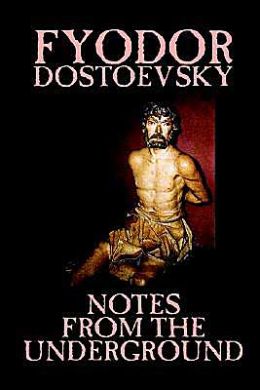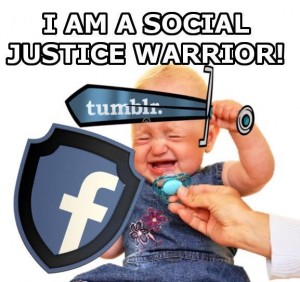Exordium
In the world of game, we talk a lot about “confidence.” Confidence is probably the most important trait to have when trying to attract women (except for, perhaps, six pack abs). It is this confidence which magnifies itself into an air of charisma which then infects those around us. Such a trait is a characteristic of the “alpha male.”
For every positive, however, there must be a negative. The opposite of confidence is doubtfulness. While the confident man attracts people through his charisma, the doubtful man often alienates them with his trepidation. This concept is explained no better than in Notes from the Underground by Fyodor Dostoyevsky.
For those who haven’t read this excellent novella, it was one of Dostoyevsky’s first works, and an introduction to his philosophy which would be further expounded in his later full length novels (The Brothers Karamazov being a prime example).
The main character is an unnamed person, who considers himself part of something called “The Underground.”Notes from the Underground is told in the first person, and reads much like a memoir or journal. The narrator, aptly dubbed “The Underground Man” by critics, is a retired civil servant who lives a miserable existence of poverty, doubt, and self-loathing.
In this article, I wish to explore the second half of this book, entitled “Apropos of the Wet Snow.” Although the first section offers an excellent refutation of rationalism, the second succinctly showcases the psychology of self-doubt taken to its extreme and its devastating effect upon life.
The Underground Man
The Underground Man is an individual intensely aware of the sickness of society and the sickness within himself. These two realizations act as equal and opposite forces which compel him into inaction. He wants to be like normal people, because he is reprehensible, but yet does not want to, because the normal people are equally disgusting.
Though I have said that I envy the normal man to the point of exasperation, yet I would not care to be in his place as he is now (though I will not stop envying him. No, no; anyway the underground life is more advantageous!) There, at any rate, one can—bah! But after all, even now I am lying! I am lying because I know myself as surely as two times two makes four, that it is not at all underground that is better, but something different, quite different, for which I long but which I cannot find! Damn underground!
This leads to his intense self-consciousness which prevents him from doing anything but worrying and fantasizing. Perhaps there is no better an example of the Underground Man’s psychology than his own words:
I hated my face, for example, found it odious, and even suspected that there was some mean expression in it, and therefore every time I came to work I made a painful effort to carry myself as independently as possible, and to express as much nobility as possible with my face. ‘Let it not be a beautiful face,’ I thought, ‘but, to make up for that, let it be a noble, an expressive, and, above all, an extremely intelligent one.’ Yet I knew, with certainty and suffering, that I would never be able to express all those perfections with the face I had. The most terrible thing was that I found it positively stupid. And I would have been quite satisfied with intelligence. Let’s even say I would even have agreed to a mean expression, provided only that at the same time my face be found terribly intelligent.
The Underground Man spends pages describing his insecurities. If you have read Notes from the Underground, you will probably remember it as being a very “exhausting” book. It takes a toll on the reader, who is put in the narrator’s shoes and forced to sit through hours of second-guessing and self-doubt. After a while, however, you began to realize something—WE are the Underground Man.
The Mirror
As Dostoyevsky masterfully voices the incessant self-doubt of the narrator, you are reminded of your own fears and insecurities. Those times you didn’t talk to that girl, because you were afraid of humiliation; when you let girlfriend control you for fear of losing her; when you broke eye contact with that dazzling 9 on the subway, because she might think you are a “creep.”
The Underground Man is a reflection of unhealthy beta male psychology, taken to the extreme. Instead of plucking up the courage to talk to a girl, however, the Underground Man spends two years building his bravery enough to bump into someone who committed a very minor insult against him in his past. Reading this book is an eerie experience, and as close to a psychological mirror as a pile of paper can get.
Notes from the Underground reveals something else, to us, however. It shows us the driving factor behind this irrational self-doubt—narcissism. This may come as a surprise. After all, aren’t the cocky, arrogant people the ones who are full of themselves? Joe Cool the high school quarterback seems like a lot more of a self-worshiping narcissist than Ned the nervous, insecure nerd. Oh, how wrong you are, my friend.
There is one underlying theme that holds this book together: the Underground Man’s arrogance. In the first part, he is arrogant enough to regard himself as an enlightened man of supreme intelligence. Although much of the language he uses is self-defacing, he has the gall to take pride in his deficiencies. Instead of attempting to solve his problems, he is so worried about his own ego, that he won’t risk the shame which might come with self-improvement. Sound like someone we know?
The Whore and the Narcissist
In the final part of the book, the Underground Man has sex with a whore named Liza. After the encounter, he lies on the bed and begins to talk with her. He manages to convince her that her life as a prostitute will end badly for her, and makes himself out to be a wise, life-saving hero. She breaks down and weeps at the end, asking to meet with the Underground Man again so he can help her reform her ways. He gives her his address and waits. As is usual with insecure betas, most of the Underground Man’s thoughts are focused on fantasizing about the life he and the Liza would share, noting every little detail in his mind.
After a little while, Liza finally comes. Liza and the Underground Man sit down together and begin to talk. This is when the monster behind his self-doubt starts to set in. He begins to scream like a maniac at Liza, announcing that he only talked to her before in order to mock her. He works himself up into a bipolar frenzy, alternating between screams of anger at Liza and tears of self-pity. His bitter, consuming narcissism becomes apparent in full force. He ends the encounter by sending Liza away and pressing a note for five rubles into her hand as she leaves, perhaps the ultimate insult to the girl.
It was under the surface the whole book, this lurking sense of something incredibly dark behind Underground Man’s pitiable self-consciousness. It is finally revealed in this climax. The Underground Man is not looking for love and acceptance. The Underground Man is looking for something to feed his preexisting conceptions of himself.
His constant worry, doubt, and trepidation are his defense mechanism for his ego. For years, he refused to do anything. He read books, fantasized about his ideal life, and idled his life away. He sulked in the Underground for years. Finally, when he had an opportunity to turn his life around and was put to the test, he snapped in a vicious rage—a last resort to defend his ego.
Gentlemen, the Underground Man is more arrogant than Nebuchadnezzar, more narcissistic than Stalin, and more entitled than the most depraved degenerate on Tumblr. Don’t take my word for it, though. Just ask this man’s victims.
Read More: How American Democracy Has Changed From The Days Of Tocqueville




This was a really interesting read, I believe in The West we have a society that is conducive to making people with the underground mans personality.
this was the first dostoevsky i ever read in russian. i found myself laughing out loud at it a lot of the time. not sure if the humor comes through in translation. or, who knows, maybe my russian isn’t as good as i think it is.
dostoevsky is supposed to be funny. If you aren’t laughing every couple of pages then you are doing something wrong. I find it helps to speak what the characters are saying outloud.
Thanks for saying that. I read all his books when I was younger and found most of them hilarious, especially “underground”.
i can’t remember much humour in crime and punishment, and the christ and the grand inquisitor stuff in brothers karamazov was pretty harrowing. one the other hand there were some hilarious scenes in the idiot. i’ve read most of these in russian and wondered if i’m reading them wrong, since people seem to consider dostoevsky a dark, serious author.
Thinking this over, I’ll admit you’re probably right. C&P and BK are both heavy, dramatic novels. It’s been 20 years since I read Dostoyevsky. The Underground man, though, is pretty funny in his pathetic way. People sometimes miss the humor in classic literature.
Black humor though?
Very powerful, thought provoking article.
Fantastic read, one of the most thought provoking articles in long while. Forces you to draw parallels to the way in which you view yourself. The way he tied in Rodger at the end was chilling
Yes writing that forces you to analyze yourself an your thought patterns are always powerful an The addition of Elliot Roger at the end did make it more chilling.
Original, thoughtful, thought provoking.
Words that sent chills down my spine: “when you let girlfriend control you for fear of losing her”
Men, don’t let this be you. (added) Your greatest fear should be losing yourself.
Correct. If you allow her to control you in any way you have already lost yourself.
Your greatest fear should be not being aware that you are losing yourself and not realizing you are when it’s too late and too expensive.
The author speaks about opposites: e.g. confidence vs. doubtfulness. And it is an excellent point especially considering the message in Notes From the Underground.
I would suggest that red-pill men should find their own choices. Not necessarily confidence vs. doubtfulness but be that guy not waiting in line. When others settle for the choices offered, find a different way.
Two roads diverged in a wood, and I—
I made a new road
And that has made all the difference.
Clever wording. Definitely an available choice. But caution ahead!
First, there’s nothing new under the sun. What didn’t work yesterday will most likely not work today. Failure, as well as success, leaves clues. It is wise to learn from the mistakes of others if you can.
“If I have seen further it is because I stand on the shoulders of giants.” No less a giant of history than Isaac Newton said that. He learned from the discoveries of others and then added to them. Others have gone before us and left a trail. Follow in their footsteps and with the extra speed gained from walking a well-trodden path catch up to where they left off. NOW add your own efforts to theirs and leave a trail further along for those who will come after you to follow. It’s called progress.
Never read it, but that’s about to change!
Holy shit that was an intense summary. Well played.
Most people think its self-love that fuels the narcissist but its actually self-hatred. The narcissists has two selfs, the true self and the false self. The true self, is broken due to narcissists upbringing(emotional, psychological abuse) from their caretakers. The true self, in defence of its shattered ego creates the false self(A false ego that the narcissists tries and fails miserably to live up to. Hence the pursuit of narcissistic supply is the working of the true self to validate and reflect the existence of the false self(unlimited beauty/, power/ success/ fame)
Very insightful.
I’ve never thought of narcissism this way, but it describes every narcissist I’ve known.
I agree with your analysis with the exception of how you framed your premise. That is it self-hatred that fuels the narcissist.
It is not self-hatred, but a self-love so boiling over-the-top that the narcissist is enraged by the fact that people will NOT recognize his wonderfulness; frustrated by the fact that HE is prevented from ACTUALIZING the wonderfulness that he KNOWS he IS.
It is not popular to say but undeniably true nevertheless, that a person cannot “hate” themselves. It is a self-contradiction and therefore cannot be true. If I truly “hated” myself, I would be happy I was a miserable failure. I would be overjoyed every time a woman rejected me. I would laugh with schadenfreude every time I lost a job, my car broke down, my friends abandoned me, or my mother said she wished she’d aborted me. I would be HAPPY I was so sad.
You see? Self-hatred is a contradiction in terms. Which is WHY it is the foundational dogma of the self-esteem heresy we have all been brainwashed with over the past 40 years. Our civilization has embraced irrationalism. Which is why the MSM is now the Ministry of Truth promoting Newspeak and Doublethink.
P.S. What most people identify as self-hatred is self-disapprobation. That is, they DISAPPROVE of themselves. They (correctly) judge themselves as lacking in different (perhaps all) areas of their life. They see clearly that they are NOT what they think and know they SHOULD be and this creates the cognitive dissonance that makes them Fffffeeeeeeeellllll so bad.
In an early, more enlightened time, it was called conviction for sin. The cure was repentance. Which, by the way, meant, “Change your thinking.”
Food for thought – have you ever seen that attractive, popular high school football captain would try to shoot fellow classmates? I guess that 90% percent of those unfortunate shooters had traumatizing event when their idealistic expectations with females were smashed into the ground. As unknown philosopher says – “Current nihilist is former idealist”.
This is a great post about a magnificent literary work of Western civilization. I remember reading this book long ago and the extreme elation I felt as I went through each page. However I think you left out mentioning that the man in the book many times talks about the dangers of self-confidence especially when it morphs into megalomaniac delusions that so many tyrants have had in the past. He also makes a strong case that extreme self-confidence is often fueled by ignorance and psychopathy. It’s the other side of the coin of what you criticize in this post. The point of the book is to expose the first true nihilist archetype of our modern times but unfortunately doesn’t go as far as to suggest as how to overcome that wretched condition.
I’m not sure Dostoyevsky ever figured it out himself, except to degree that he “threw himself upon God” as the only One who could sort us out.
Since the narcissist is pathologically absorbed with himself, the “cure” would seem to be to get “out” of oneself. The only way to do that is to find something more fascinating, more beautiful, more intriguing, more absorbing, than oneself.
The only Being in this universe that answers to that description is God. To acknowledge Him is to admit that YOU are not the center of the universe, nor ought you to be. He is the only check on unrestrained narcissism.
And it was Dostoyevsky who said, “If there is no God, everything is permitted.”
Great write up. There is a wealth of lessons for men in the writings of Tolstoy, Dostovesky, Gogol, Chekov, and Turgenev.
You have reminded me of one of my favorite youtube series. They did a video on this book a little over a year ago. The analysis can only be so comprehensive in a 5 minute video, but I like the presentation.
Aaahhhh shit! He’s calling them out! You heard it here first!
It’s too painful for them and they will dismiss it out of hand. Frankly, they avoid that kind of constructive introspection like their life depends on it. Their ego is so fragile, that in some way it does.
Most excellent article!
I read it last year, almost in a rush and highlighting the most interesting thoughts which, for my money, illustrate the sickness of society and of the individual, as the author too wrote. “I swear to you gentlemen, that to be overly conscious is a sickness, a real, thorough sickness.”
There are other thoughts in the book touching subtle ideas, metaphysics and similar. I recommend reading it, although many won’t identify with some of the anonymous protagonist’s thoughts.
If the educators were not all a bunch of liberal retards, we would have all the children reading stuff by Dostoyevsky, rather than ridiculous SJW-type stuff like The Scarlet Letter, which is an absolutely ridiculous caricature of traditional America.
It would actually be helpful for youngsters to engage with these ideas about the human condition.
If anyone is interested in narcissism, especially to explore the extent to which they-themselves are narcissistic and what to do about it, I strongly recommended the writings of The Last Psychiatrist. All of his articles speak about narcissism to some degree, but the three best ones are: (1) http://thelastpsychiatrist.com/2010/11/a_generational_pathology.html and (2) http://thelastpsychiatrist.com/2010/02/the_other_ego_epidemic.html and (3) http://thelastpsychiatrist.com/2012/10/the_story_of_narcissus.html
Fuck…this sent chills down my spine. I just read a full description of myself on this. And i never realized what the problem was. I’m a narcisistic mofo. Thanks for enlightening me.
Well, at least you’re not pathologically narcissistic. If you were pathological you’d never see yourself in such a description.
Oh, but unfortunately Freud was wrong. Enlightenment isn’t enough. Now get to work!
[Wry Smile for Encouragement]
Good education + good experiences = confidence. No shortcuts.
I really dig posts like this. I’ll buy this book now. I like books that make me think. Thanks.
This is a really great review. It makes me want to read this book.
There is something I for sure can recognize in my personal life, althought the archtype portrayed seems quit extreme.
No doubt there are lots of keyboard warriors sitting about in various places, plagued with selfdoubt and a revulsion against society.
One really needs to learn to strike a balance. Avoid becoming an overconfident psychopath, but at the same time not become a passive frustrated narcissist.
“No doubt there are lots of keyboard warriors sitting about in various places, plagued with selfdoubt and a revulsion against society.”
So true. And also, perhaps, “. . .plagued with a revulsion against society because of their own self-doubt and loathing.”
“One really needs to learn to strike a balance. Avoid becoming an overconfident psychopath, but at the same time not become a passive frustrated narcissist.”
Nice juxtaposition of the two extremes. The test is TRW – The Real World. Take your personality out into society and interact. collect feedback and review it honestly. Identify places for improvement and research the best ways to do that. Go back out into the world and repeat.
“Dying is easy. Comedy is hard.”
This was a well thought out commentary on that story. It’s nice that I can still find articles here but don’t consist of bashing opposing political ideologies.
Holy shit. That hit home. Thing is, what do I do about it?
That is the $64,000 question (is my age showing?). Welcome to the purpose and meaning of your life!
Imagine you are going to live for 1,000 years. What kind of a mindset would you want/need/desire to cultivate for so long a journey? What would you need to believe/accept/embrace to give your life Deep Satisfaction? Overflowing Peace? Encompassing Joy?
And once you have those, what do you want to DO with the rest of your years?
To someone without a lot of confidence, who is open-minded to the possibility of unknowingly being a narcissist, this might read somewhat like:
“You should be ashamed of who you are. You shall be ashamed of not having confidence. You shall be ashamed of feeling *shame* instead of *guilt*! And you shall most certainly be ashamed for being a virgin, for only a woman’s hallowed pussy may validate your existence!
Creep.”
Is demoralization what you’re going for here?
It’s called projection. Look into it.
The heart of Dostoyevsky’s point is to illustrate this maxim: “The heart is deceitful above all things and desperately wicked. Who can know it?” All of our reasons for why we are where and what we are and not where and what we ought to be are only excuses for not doing what we ought to do to be the master of our own mind and emotions; King of our inner castles. THAT is the only true success.